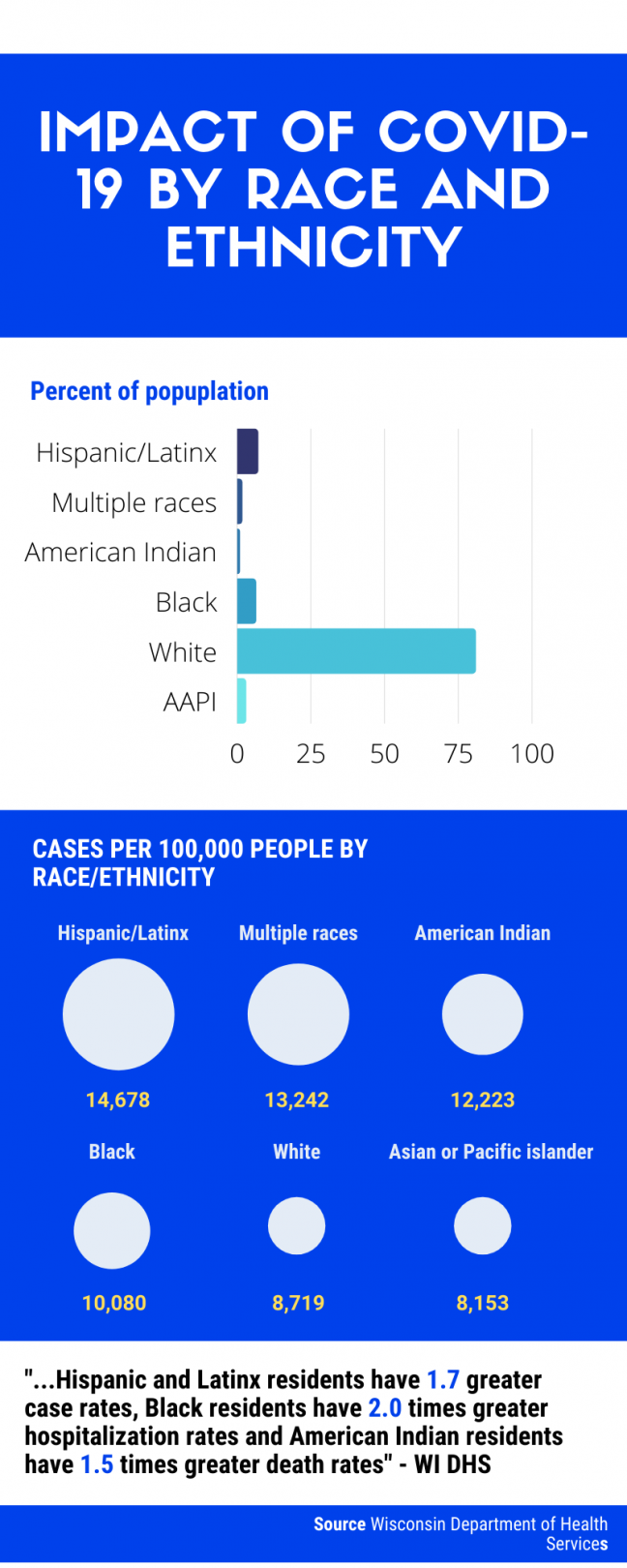The Foundation for Black Women’s Wellness works to empower a new generation of Black women — efforts which have been especially visible throughout the COVID-19 pandemic.
The Foundation is a nonprofit organization working to improve Black women’s health in Wisconsin through advocacy, support and education.
Chief Programs Officer Alia Stevenson said the foundation works to elevate and advance Black women’s health as a community and public health priority since its foundation in 2012.
Reports have found Black Americans are more likely than whites and Hispanics to die before age 75 from treatable and preventable illnesses. Additionally, Wisconsin leads the nation in Black infant mortality, as Black infants are twice as likely as other infants to die before their first birthday.
University of Wisconsin School of Nursing Associate Professor Pamela McGranahan saw this crisis firsthand through working in the field.
“We don’t talk enough about Black moms doing as well either,” McGranahan said in reference to Black women’s experience with pregnancy. “But at one point, Black women had four times more poor outcomes than white women.”
According to McGranahan, Black women are more likely to experience conditions such as preeclampsia and hypertension and are more likely to have babies born prematurely.
These statistics are all too familiar to foundation members like Stevenson, who dealt with heart failure at the age of 26 during her own pregnancy.
“This is one of the reasons I decided to join the foundation,” Stevenson said. “The work of the foundation is personal for all of us.”
CEO, founder and president of the foundation Lisa Peyton-Caire became passionate about Black women’s wellness after the loss of Peyton-Caire’s mother to heart disease at the age of 64.
Peyton-Caire started the annual Black Women’s Wellness Day summit dedicated to informing, inspiring and empowering women and girls to build and sustain healthy, wellness-centered lives.
As the success of the event grew, Peyton-Caire established The Foundation for Black Women’s Wellness so their work could benefit the community at a greater level.
As the COVID-19 pandemic increased in severity, the foundation was forced to close its door in March 2020 and shift its focus for the time being.
“We had to regroup and pivot quickly in order to meet community needs,” Stevenson said. “We turned our attention to crisis response and to fostering resilience and recovery among those we serve. We moved our programming online and implemented new ways to engage our community beyond the walls of our building.”
According to Stevenson, the momentary shift to virtual community outreach allowed the foundation to reach more women in not only Wisconsin, but across a total of 26 states.
Since May, the foundation has dispersed over $70,000 in COVID-19 emergency relief dollars and helped over 400 families deal with the pandemic, Stevenson said. The foundation assists these families through financial support, eviction prevention and providing essential needs.
The COVID-19 pandemic exacerbated pre-existing racial healthcare disparities.
In an attempt to lessen those disparities, the foundation partnered with Public Health Madison and Dane County to promote community COVID-19 safety education, mask distribution, expanded testing and quality care and access for highly impacted communities, Stevenson said.
According to the Wisconsin Department of Health Services, communities of color experience higher rates of COVID-19 cases, hospitalizations and deaths. Though Black residents make up only 6.4% of the state’s population, they account for a total of 11.8% of COVID-19 hospitalizations.
A cause for this disparity is the stress and tension Black individuals face in their daily lives due to societal inequities, which McGranahan said can impact their immune system through epigenetics.
According to the CDC, epigenetics involves looking at how a person’s behaviors and their environment can influence how their genes work. Researchers have also found trauma experienced by relatives can actually be passed down through DNA, suggesting generations of racial violence can have lasting physical impacts on communities of color.
Epigenetics coupled with healthcare barriers and living situations is a possible explanation for these disparities, McGranahan explained.
“It has been documented over and over again that white people and people of color have a different experience in their interactions with healthcare,” McGranahan said.
In order to decrease disparities in healthcare and those specific to COVID-19, McGranhan said it is necessary healthcare workers recognize these inequities and obstacles for individuals.
In order for healthcare workers to recognize these obstacles faced by certain groups, there needs to be empowerment and advocacy, McGranahan said.
Wisconsin State Rep. LaKeshia Myers (D-Milwaukee) said these disparities are a direct result of women not being listened to regarding their health.
“When we attack it from that perspective, you have to think about the long history of women and African Americans in general who have not been listened to when it came to their own healthcare,” Myers said.
AstraZeneca changes vaccine efficacy estimate, experts say vaccine is still highly effective
The Foundation for Black Women’s Wellness championed for many years in the space of equitable healthcare for all people, Myers said. Myers hopes this work continues to combat the medical apartheid experienced by Black Americans across the country.
The foundation is currently working toward building a policy blueprint for Black women’s health in order to chart a clear course of action to guide and inform tangible improvement of Black women’s wellness, Stevenson said.
The foundation is also launching the Well Black Woman Institute soon, after receiving a $1 million five-year grant from the Wisconsin Partnership Program.
The program seeks to equip Black women with knowledge, skills, information and access to networks of power in order to lead powerful change in their communities and connect them with systems, decision-makers and resources in order to bring the health equity transformation they seek, Stevenson said.
“These experiences are rooted in racial inequality and social and economic disparities,” Stevenson said. “In other words, they can be changed and we want to be part of the change.”


